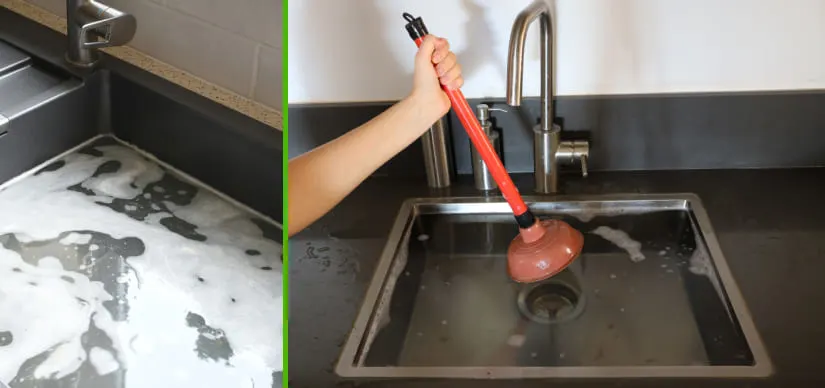Top 10 Reasons Why Your Kitchen Sink Clogs Both Sides
Views : 971

Top 10 Reasons Why Your Kitchen Sink Clogged Both Sides
For luxe bathroom upgrades, installing a bidet and washlet is something you should try. Here’s why:
Food Buildup:
Food particles can accumulate in the drains over time, especially if you must be more careful about what goes down the sink. These particles can combine and form twin sink blockage.
Grease and Fat
Grease and fat from cooking can solidify inside the pipes, narrowing the passage for water flow. This can lead to a clogged double kitchen sink when this happens on the sink.
Soap Scum:
Soap residue can stick to the walls of the pipes, trapping other debris and causing clogs in both drains. This often occurs if you use a lot of soap while washing dishes.
Foreign Objects:
Accidentally dropping items like utensils or small objects down the kitchen sink can clog both sides. These objects can lodge in the pipes, impeding water flow.
Mineral Deposits:
Minerals from hard water can build up inside the pipes, restricting water flow and causing clogs in both sink drains. This is common in areas with hard water.
Pipe Misalignment:
If the pipes underneath the sink are not correctly aligned or installed, debris can collect and clogs can form in both drains.
Old or Faulty Plumbing:
Aging or deteriorating pipes can develop cracks, leaks, or corrosion, leading to clogs on both sides of the sink. This is especially true if the plumbing hasn’t been maintained or upgraded.
Tree Root Intrusion:
Tree roots seeking moisture can block underground pipes connected to the sink drains, clogging the kitchen sink on both sides. This is more common in outdoor plumbing systems.
Garbage Disposal Overuse:
Using the garbage disposal excessively or disposing of the wrong items can lead to clogs in both sink drains. Items like coffee grounds, eggshells, and fibrous foods can contribute to blockages.
Inadequate Ventilation:
Poor ventilation in the plumbing system can create air pressure imbalances, leading to a double drain clog of the sink.
Tips on Preventing Kitchen Sink Clogged Both Sides
Dispose of Food Properly:
Throw food scraps into the trash rather than letting them go down the Dispose of Food Properly. Additionally, a sink strainer should be used to catch any remaining bits and clean them after each use.
Avoid Pouring Grease:
Pour grease and oils into a heat-resistant container, then dispose of them in the trash once they solidify. This prevents them from congestion in the pipes.
Use Less Soap:
Use minimal amounts of soap while washing dishes to reduce soap scum buildup. Consider using liquid dish soap instead of bar soap, as it’s less likely to leave residue.
Be Careful with Objects:
Be mindful of what you put down in the dual kitchen sink clog. Avoid letting small objects or utensils fall into the sink, as they can cause blockages.
Install a Water Softener:
Consider installing a water softener if you have hard water. This can help prevent mineral buildup in the pipes, reducing the risk of clogs.
Regular Maintenance:
Schedule regular inspections of your plumbing system to catch any issues early on. Replace old or faulty pipes as needed to prevent dual sink blockage from occurring.
Trim Trees and Shrubs:
Keep trees and shrubs near outdoor plumbing lines trimmed to prevent root intrusion. This reduces the likelihood of roots causing blockages in the pipes.
Use Garbage Disposal Wisely:
Use your garbage disposal sparingly and only for appropriate items. Avoid putting fibrous foods, coffee grounds, and grease down the disposal, as they could block the double sink.
Improve Ventilation:
Ensure proper ventilation in your plumbing system to maintain optimal water flow. This can help prevent slow drainage and clogs.
Seek Professional Help:
If you’re unsure how to prevent or address a kitchen sink that is clogged on both sides, don’t hesitate to seek professional plumbing assistance. A qualified plumber can offer guidance and perform preventative maintenance to keep your sinks flowing smoothly.
DIY Attempts:
Consider any DIY attempts you’ve made to unclog the sink if you’ve tried basic methods like plunging or using a drain snake without success. Then, it may indicate a more stubborn kitchen sink clogged on both sides that requires professional attention.
Plumbing Knowledge:
Evaluate your plumbing knowledge and skills. If you’re unfamiliar with plumbing systems or lack the necessary tools, it’s safer to hire a professional plumber who can diagnose and fix the problem correctly.
Time and Convenience:
Consider your schedule and availability. Hiring a professional can save you time and effort, especially if you have a busy schedule and are dealing with a stubborn sink that is clogged on both sides.
Budget:
Compare the cost of hiring a professional plumber versus the potential expenses of DIY attempts gone wrong. While professional services may incur upfront costs, they can save you money in the long run by preventing further damage or recurring clogs.
Reputation:
Research local plumbers and check their experience and reputation. Look for licensed and insured professionals with positive reviews and a track record of successfully resolving a double drain clog.
Warranty and Guarantees:
Inquire about warranties or guarantees offered by the plumbing service. A reputable plumber should stand behind their work and ensure the problem will be resolved satisfactorily.
Emergency Services:
Determine if the clog requires immediate attention, such as if it’s causing flooding or sewage backup. In such cases, look for plumbers who offer emergency services and can respond promptly to mitigate further damage
Cost to Fix a Double Basin Clog
The cost to fix a clog in both sink drains typically ranges from $100 to $300. This may include the plumber’s service fee, labor costs and any materials or equipment needed for the job.
The cost may be lower for minor clogs that can be cleared with simple tools like a plunger or drain snake. However, more complex clogs that require professional expertise and specialized equipment may incur higher costs.
Additionally, emergency services or after-hours repairs may incur additional charges. To avoid any surprises, it’s essential to discuss pricing and obtain a quote from the plumber before proceeding with the repairs.
